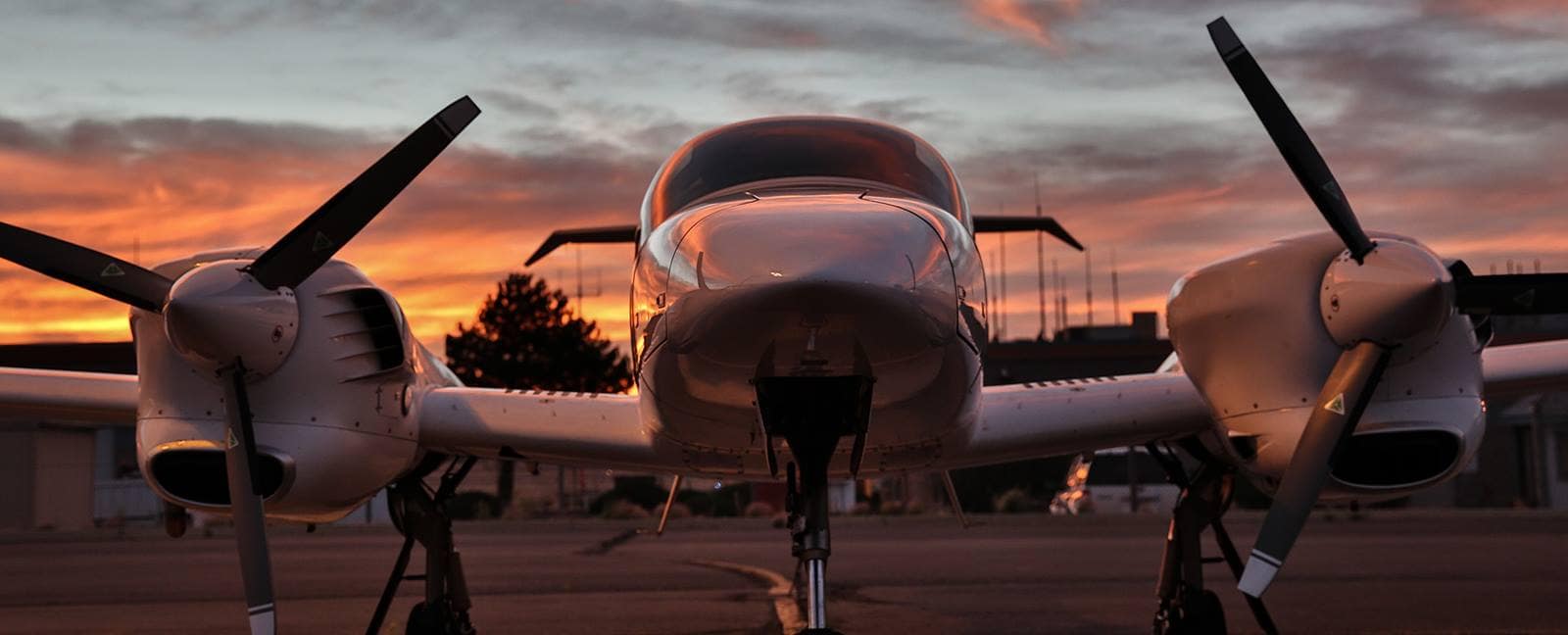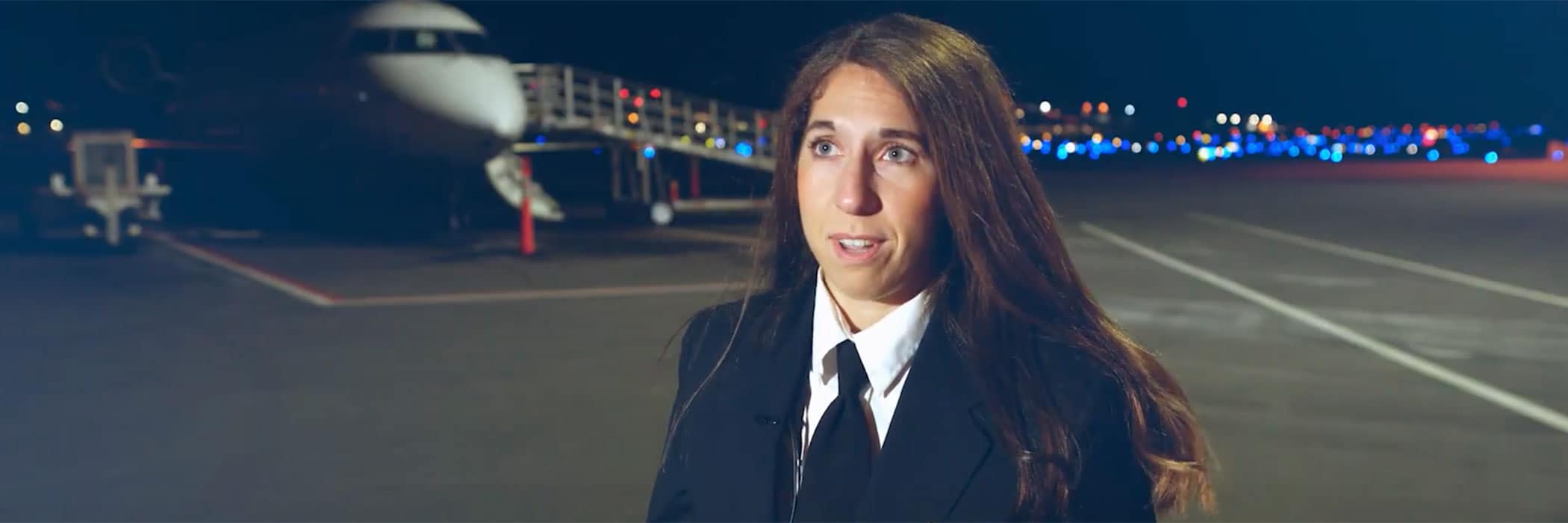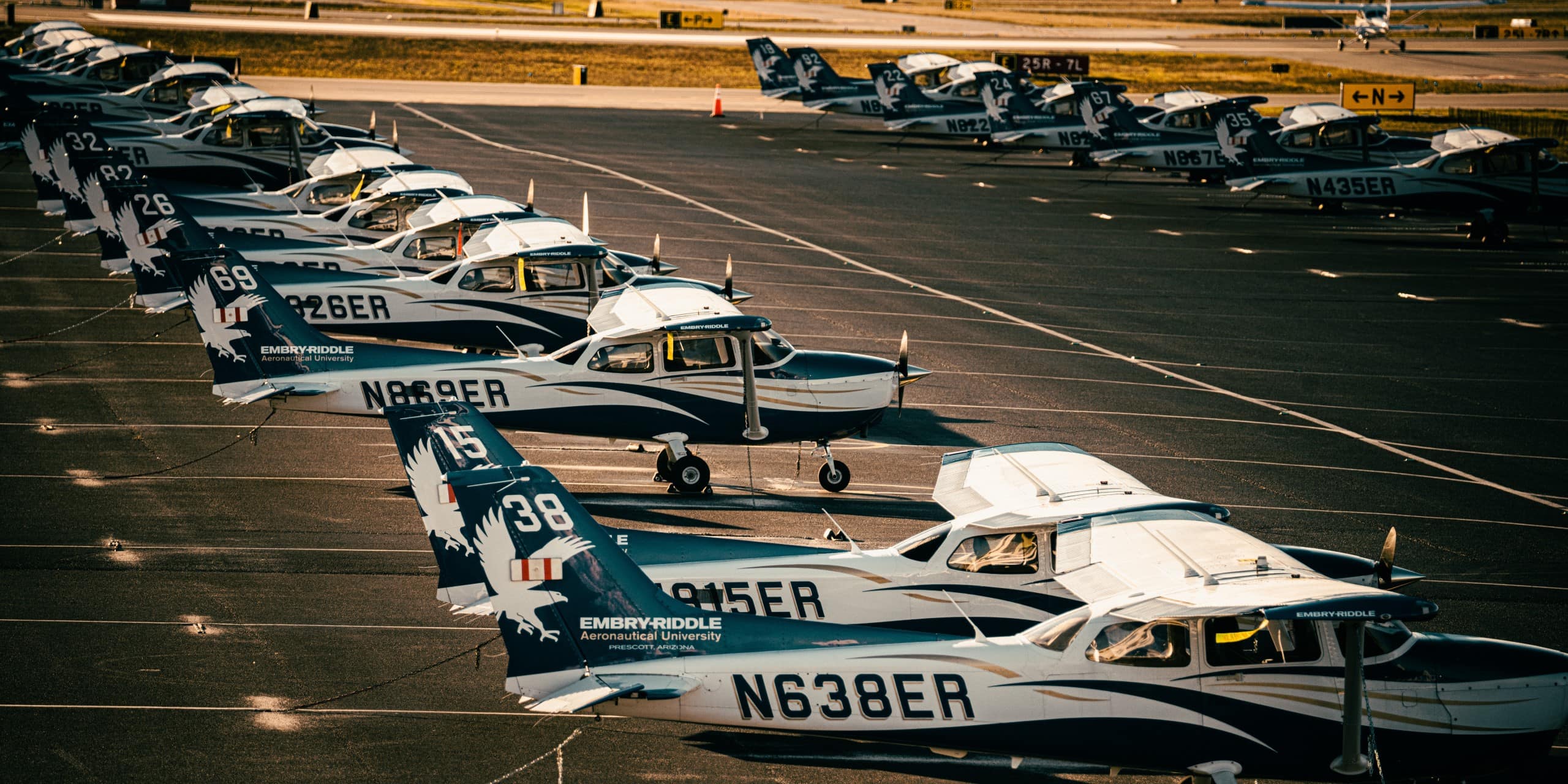
Bachelor of Science in
Aeronautics
This respected degree is designed specifically for students who work, have worked or want to work in aviation-related careers and awards credit for prior experience.
About the Bachelor of Science in Aeronautics
The Bachelor of Science in Aeronautics (BSA) degree program requires interesting and relevant curriculum to ensure the highest standards of performance, quality, integrity, flight training and flight ratings are maintained.
Embry-Riddle Aeronautical University is recognized as a leader in the aviation industry, producing quality graduates who can successfully enter and succeed in the workforce. For students with existing aviation-related knowledge and skills, this aviation degree then builds on acquired experience, skills and knowledge. The program also provides an opportunity for students new to aviation to acquire aviation-specific knowledge through aviation-related coursework.
Student Learning Outcomes
While earning a degree in aeronautics, you will have the opportunity to:
- Gain understanding in the areas of airplanes, helicopters, air traffic control or other areas of aviation
- Develop practical skills focused on safety, training operations, dispatch, flight training and transportation
- Explore interests in designing an airplane or other types of flying machines, manufacturing aircraft, operating aircraft and maintaining them
Aeronautics Career Opportunities
Careers and Employers
The 2023 Boeing Pilot & Technician Outlook projects a global need for 649,000 new commercial airline pilots and 690,000 maintenance technicians over the next 20 years. With a 95% placement rate, Embry-Riddle graduates are set to enter the aerospace industry, finding careers as flight instructors, air traffic controllers, aviation investigators and pilots.
Students earning an aviation degree often accept employment offers from top companies such as Boeing, Northrop Grumman, Lockheed Martin and the US Military.
Aeronautics Salary Information
With demand in the aerospace industry rising, earning an aviation degree from Embry-Riddle provides the opportunity for competitive salaries, with alumni averaging $86,000 annually.
DETAILS
This offering is available at the following campuses. Select a campus to learn more.
About Aeronautics at the Daytona Beach, FL Campus
The Bachelor of Science in Aeronautics degree program at the Daytona Beach Campus combines a student’s work experience in the aerospace industry with aviation courses and flight training. This degree is housed in the Department of Aeronautical Science in the Daytona Beach Campus College of Aviation.
The Daytona Beach Campus maintains a modern fleet of aircraft and a host of advanced flight simulation devices, allowing students to simultaneously earn a high-quality, industry-recognized, four-year degree and flight ratings.
Note: The flight program at the Daytona Beach Campus is currently at maximum capacity. At this time, flight training on campus is only available to students in the Aeronautical Science major.
Tracks/Specialties and/or Certificates
The Daytona Beach Campus offers students pursuing aeronautics the following options:
- A flight minor is approved for the Restricted Airline Transport Pilot certificate program. The FAA-approved ATP-CTP course is available to Aeronautics students.
- To complete the Area of Concentration (AOC), students may select courses in Aeronautical Science, Air Traffic Management, Applied Meteorology (aviation-related), Aviation Maintenance Science, Cooperative Education, Flight, Homeland Security, Safety (aviation-related), Simulation, Space Studies, Spaceflight Operations or Unmanned Aircraft Systems Science.
Aeronautics Information
- Credits: 120
- Online or In-Person: In-Person
Professional Accreditation
The Aeronautics program is accredited by the Aviation Accreditation Board International (AABI).
Helpful Links
- Tour our Daytona Beach campus
- Discover the Department's Faculty
- Explore the Fields of Study: Aviation & Space
- Find Related Clubs & Organizations
Aeronautics Curriculum
The curriculum to be followed by each student will vary depending on any AOC prior learning or transfer credits granted.
General Education Requirements
For a full description of Embry-Riddle General Education guidelines, please see the General Education section of this catalog. These minimum requirements are applicable to all degree programs.
| General Education | ||
| Communication Theory and Skills * | 9 | |
| Lower-Level Humanities * | 3 | |
| Lower-Level Social Sciences * | 3 | |
| Lower or Upper-Level Humanities or Social Sciences * | 3 | |
| Upper-Level Humanities or Social Science * | 3 | |
| Computer Science | 3 | |
| Mathematics (College Algebra or Higher, and MA 112 or MA 222) ** | 6 | |
| Physical and Life Sciences. One course must include a laboratory. ** | 6 | |
| Total Credits | 36 | |
- *
Embry-Riddle courses in the general education categories of Communication Theory and Skills, Mathematics, Computer Science, Physical and Life Sciences, Humanities, and Social Sciences may be chosen from approved list of General Education courses, assuming prerequisite requirements are met and with the permission of the advisor. Courses from other institutions are acceptable if they fall into these broad categories and are at the level specified above in the Aeronautics vertical outline. Other courses may also be used with the permission of a department chair.
- **
Students need to ascertain Mathematics and Physical Sciences pre/corequisites that are required for other courses. For example, PS 113 and MA 112 are required for many upper-division AS courses.
Curriculum
| General Education | 36 | |
| Aviation Area of Concentration | 30 | |
| Select from (100-400) courses in AMS, AS, AT, CEA, CSO, CYB, FA, GEO, HSI, SF, SIM, SP, UA, WX | ||
AS 120 | Principles of Aeronautical Science | |
or AS 121 | Private Pilot Operations | |
AS 254 | Aviation Legislation | |
AS 405 | Aviation Law | |
AS 474 | Operational Applications in Aeronautics | |
SF 210 | Introduction to Aerospace Safety | |
| Program Support | 7 | |
ASC 101 | Aeronautical Science Student Success Seminar | |
or UNIV 101 | College Success | |
BA 201 | Principles of Management | |
or ACC 210 | Financial Accounting | |
| Select one of the following: | ||
EC 200 | An Economic Survey | |
EC 210 | Microeconomics | |
EC 211 | Macroeconomics | |
| Professional Development Electives | 33 | |
Select from upper-level (300-400) courses in ACC, AMS, AS, AT, BA, CEA, CSO, CYB, EC, FA, FIN, GEO, HSI, MK, SF, SIM, SP, UA, WX | ||
| Open Electives | 14 | |
| Total Credits | 120 | |
Suggested Plan of Study
Due to the requirement for one minor and the inherent flexibility of this degree, it is imperative to work closely with your academic advisor to ensure degree requirements are met.
| Year One | ||
|---|---|---|
| Credits | ||
| AS 120 | Principles of Aeronautical Science | 3-5 |
or AS 121
|
Private Pilot Operations | |
| UNIV 101 | College Success | 1 |
or ASC 101
|
Aeronautical Science Student Success Seminar | |
| Aviation Area of Concentration* (Only if taking AS 120) | 3 | |
| BA 201 | Principles of Management | 3 |
or ACC 210
|
Financial Accounting | |
| COM 122 | English Composition | 3 |
| MA 111 | Pre-Calculus for Aviation | 3 |
| MA 112 | Applied Calculus for Aviation | 3 |
or MA 222
|
Business Statistics | |
| EC 200 | An Economic Survey | 3 |
or EC 210
|
Microeconomics | |
or EC 211
|
Macroeconomics | |
| HU 14X Humanities Lower Level | 3 | |
| Social Science Lower Level | 3 | |
| SF 210 | Introduction to Aerospace Safety | 3 |
| Credits Subtotal | 31.0-33.0 | |
| Year Two | ||
| AS 254 | Aviation Legislation | 3 |
| CS Elective | 3 | |
| COM 219 | Speech | 3 |
| COM 221 | Technical Report Writing | 3 |
| HU/SS Lower or Upper Level Elective | 3 | |
| PS Elective | 6 | |
| PS Lab ** (Lab may count as Open Elective credit) | 0-1 | |
| Aviation Area of Concentration | 3 | |
| Professional Development Elective | 3 | |
| Open Elective | 3 | |
| Credits Subtotal | 30.0-31.0 | |
| Year Three | ||
| AS 405 | 3 | |
| HU/SS Upper Level Elective | 3 | |
| Aviation Area of Concentration | 6 | |
| Professional Development Electives | 15 | |
| Open Elective | 3 | |
| Credits Subtotal | 30.0 | |
| Year Four | ||
| AS 474 | 3 | |
| Aviation Area of Concentration | 1 | |
| Professional Development Electives | 15 | |
| Open Elective | 10-11 | |
| Credits Subtotal | 29.0-30.0 | |
| Credits Total: | 120 | |
Get Started Now:
Summary
120 Credits
Estimate your tuition by using the Tuition Calculator
View Financial Aid Information
Learn about our General Education
Find out about transferring credits to this degree
Learn more about our Veterans & Military benefits
View our Academic Calendar

Spotlight
About Aeronautics at the Prescott, AZ Campus
The Bachelor of Science in Aeronautics program at the Prescott Campus is a combination of a student’s learning and experience with aviation-related careers, whether in fixed-wing, helicopter, air traffic control, or other areas of aviation.
At the Prescott Campus, students can earn a high-quality, industry-known, four-year degree and their flight ratings simultaneously, while attending classes in dynamic, aviation-related labs and facilities. Embry-Riddle maintains a modern fleet of aircraft and a host of advanced flight simulation devices with advanced visual systems.
Tracks/Specialties and/or Certificates
The Prescott Campus offers students pursuing aeronautics the following options:
- A flight minor is approved for the Restricted Airline Transport Pilot certificate program. The FAA-approved ATP-CTP course is available to Aeronautics students.
- To complete the Area of Concentration (AOC), students may choose from a wide variety of courses, including options such as Aeronautical Science, Flight, Air Traffic Management, Safety (aviation-related), or Applied Meteorology (aviation-related).
Aeronautics Information
- Credits: 120
- Online or In-Person: In-Person
Professional Accreditation
The Aeronautics program is accredited by the Aviation Accreditation Board International (AABI).
Helpful Links
- Tour our Prescott, Arizona campus
- Discover the Department's Faculty
- Explore the Fields of Study: Aviation & Space
- Find Related Clubs & Organizations
Degree Requirements
The Bachelor of Science degree in Aeronautics requires successful completion of a minimum of 120 credit hours (typically 8 semesters). A minimum of 40 credit hours must be upper-level. The curriculum to be followed by each student will vary depending on any AOC prior learning or transfer credits granted.
Program Requirements
General Education
Embry-Riddle degree programs require students to complete a minimum of 36 hours of General Education coursework. For a full description of Embry-Riddle General Education guidelines, please see the General Education section of this catalog.
Students may choose other classes outside of their requirements, but doing so can result in the student having to complete more than the degree's 120 credit hours. This will result in additional time and cost to the student.
| Communication Theory and Skills | 9 | |
| Computer Science/Information Technology | 3 | |
| Mathematics | 6 | |
| Physical and Life Sciences (Natural Sciences) | 6 | |
| Humanities or Social Sciences | 12 | |
3 hours of Upper Level Humanities | ||
3 hours of Lower-Level Social Science | ||
3 hours of Lower-Level or Upper-Level Humanities or Social Science | ||
3 hours of Upper-Level Humanities or Social Science | ||
| Total Credits | 36 | |
Aeronautics Core (44 Credits)
| Aeronautics Core | ||
| ACC 210 | Financial Accounting * | 3 |
| or BA 201 | Principles of Management | |
| COM 122 | English Composition # | 3 |
| Economics Elective Lower-Level | 3 | |
| General Education - Communications Elective # | 6 | |
| General Education - Computer Science / Information Technology Elective # | 3 | |
| General Education - Humanities Lower-Level Elective # | 3 | |
| General Education - Natural Sciences (One course must include a laboratory) # | 7 | |
| General Education - Social Science Lower-Level Elective # | 3 | |
| MA 111 | Pre-Calculus for Aviation # | 3 |
| or MA 140 | College Algebra | |
| MA 112 | Applied Calculus for Aviation # | 3 |
| or MA 222 | Business Statistics | |
| PSY 101 | Introduction to Psychology (OR Social Science Lower-Level Elective) # | 3 |
| PSY 350 | Social Psychology (OR Humanities or Social Science Upper-Level Elective) **# | 3 |
| UNIV 101 | College Success | 1 |
Aviation Area of Concentration (40 Credits)
| AS 120 | Principles of Aeronautical Science | 3-5 |
| or AS 121 | Private Pilot Operations | |
| or AS 125 | Private and UAS Pilot Operations | |
| or AS 143 | Private Helicopter Operations | |
| AS 207 | Introduction to Aviation Research Methods | 3 |
| AS 405 | Aviation Law | 3 |
| AS 480 | Applied Aviation Research Methods (or Approved Internship) | 3 |
| or AS 410 | Airline Dispatch Operations | |
| or AS 490 | Helicopter Specialty Capstone | |
| Advanced standing credit and/or non-duplicating credit from Aviation Maintenance Science, Aviation Maintenance Technology, Aeronautical Science, Air Traffic Management, CEA, Flight Airplane, Flight Helicopter, Geoscience, Safety Science, or Weather courses | 26-28 | |
Professional Development Electives (21 Credits)
| Accounting, Aviation Maintenance Science, Aeronautical Science, Air Traffic Management, Business Administration, Computer Science, Cyber Intelligence, Economics, Geoscience, Finance, Safety Science, Simulation Science, or Weather Upper-Level Electives | 21 | |
Open Electives (15 Credits)
| Open Electives | 15 | |
| Total Credits | 120 | |
- *
Offered in Fall Only
- **
Offered in Spring Only
- #
General Education Courses
All Army ROTC students are required to complete SS 321 - U.S. Military History 1900-Present (3 credits) in order to commission.
Get Started Now:
Summary
120 Credits
Estimate your tuition by using the Tuition Calculator
View Financial Aid Information
Learn about our General Education
Find out about transferring credits to this degree
Learn more about our Veterans & Military benefits
View our Academic Calendar

Spotlight
About Aeronautics at the Worldwide & Online Campus
The Bachelor of Science in Aeronautics is a multidisciplinary online or on-campus degree program that combines previous work experience with courses of study in human factors, security, aviation safety, occupational safety and health, air traffic control, aircraft maintenance and aeronautical science.
At the Worldwide & Online Campus you can structure your education around your lifestyle, taking classes where you want and when you want. Students can earn more than a quarter of the required semester hours from prior learning experience and receive their bachelor’s degree in as few as three years.
Tracks/Specialties and/or Certificates
*Graduates from the Worldwide Bachelor of Science in Aeronautics are not eligible to apply for a restricted privileges airline transport pilot (ATP) certificate.
Aeronautics Information
- Credits: 120
- Online or In-Person: Fully online, EagleVision Virtual Classroom or see if a Worldwide location is close to you
Professional Accreditation
The Aeronautics program is accredited by the Aviation Accreditation Board International (AABI).
Royal Aeronautical Society
The Bachelor of Science in Aeronautics program is recognized by the Royal Aeronautical Society (RAeS).
Helpful Links
- Attend a Worldwide Virtual Info Session
- Discover the Department's Faculty
- Explore the Fields of Study: Aviation & Space
- Find Related Clubs & Organizations
DEGREE REQUIREMENTS
General Education
| General Education | ||
| Embry-Riddle courses in the general education categories of Communication Theory and Skills, Humanities, Social Sciences, Physical and Life Science, Mathematics, and Computer Science may be chosen from as listed, assuming prerequisites are met. Courses from other institutions are acceptable if they fall into these broad categories and are at the level specified. | ||
| Communication Theory and Skills | ||
| Any Communication Theory and Skills above ENGL 106 | 9 | |
| Humanities | ||
| Lower-Level Humanities (Any Lower or Upper Level Humanities) | 3 | |
| Upper-Level Humanities (Any Upper Level Humanities) | 3 | |
| Social Sciences | ||
| Any Social Science | 6 | |
| Physical and Life Science | ||
| Any Physical Science/Physics | 6 | |
| Mathematics | ||
| Any College Algebra or Higher Math Series | 6 | |
| Computer Science | ||
| Any Computer Science | 3 | |
| Total Credits | 36 | |
Core/Major
| Aviation Area of Concentration | 18 | |
| Make up shortages with non-duplicating courses from the following disciplines: Aeronautical Science, Aviation Maintenance, and related aviation/aerospace coursework in Transportation, Safety, Security, History, Engineering, and Uncrewed Systems. | ||
| Program Support | 24 | |
| ASCI 202 | Introduction to Aeronautical Science | 3 |
| ASCI 254 | Aviation Legislation | 3 |
| ASCI 404 | Applications in Aviation & Aerospace Law | 3 |
| STAT 211 | Statistics with Aviation Applications | 3 |
| MGMT 201 | Principles of Management | 3 |
| ACCT 210 | Financial Accounting | 3 |
| MMIS 221 | Introduction to Management Information Systems | 3 |
| UNSY 315 | Uncrewed Aircraft Systems and Operations | 3 |
| Professional Development Core | 12 | |
| ASCI 491 | Operational Applications in Aeronautics | 3 |
| SCTY 400 | Aviation Security | 3 |
| LGMT 420 | Management of Production and Operations | 3 |
| BSAS 409 | Aviation Safety | 3 |
Electives
| Professional Development Electives (Upper Level) | 21 | |
| Select from courses in available Minor Courses of Study or as accepted in these related disciplines, and Technology. | ||
| Open Electives (Upper or Lower Level) | 9 | |
| Total Degree Requirements | 120 | |
Footnotes*
Minnesota student residents refer to State of Minnesota Course Requirement statement for Humanities requirements.
Suggested Plan of Study (BSA)
Freshman Year
| Term 1 | Credits | |
|---|---|---|
| Communication Theory/Skills above ENGL 106 | 3 | |
| College Algebra or Higher Math Series | 3 | |
| Credits Subtotal | 6.0 | |
| Term 2 | ||
| Communication Theory/Skills above ENGL 106 | 3 | |
| College Algebra or Higher Math Series | 3 | |
| Credits Subtotal | 6.0 | |
| Term 3 | ||
| Humanities LL | 3 | |
| Physical Science/Physics | 3 | |
| Credits Subtotal | 6.0 | |
| Term 4 | ||
| Social Science | 3 | |
| Computer Science | 3 | |
| Credits Subtotal | 6.0 | |
| Term 5 | ||
| Communication Theory/Skills above ENGL 106 | 3 | |
| ASCI 202 | Introduction to Aeronautical Science | 3 |
| Credits Subtotal | 6.0 | |
| Credits Total: | 30.0 | |
Sophomore Year
| Term 1 | Credits | |
|---|---|---|
| ASCI 254 | Aviation Legislation | 3 |
| Social Science | 3 | |
| Credits Subtotal | 6.0 | |
| Term 2 | ||
| MGMT 201 | Principles of Management | 3 |
| Physical Science/Physics | 3 | |
| Credits Subtotal | 6.0 | |
| Term 3 | ||
| ACCT 210 | Financial Accounting | 3 |
| Open Elective | 3 | |
| Credits Subtotal | 6.0 | |
| Term 4 | ||
| MMIS 221 | Introduction to Management Information Systems | 3 |
| Open Elective | 3 | |
| Credits Subtotal | 6.0 | |
| Term 5 | ||
| STAT 211 | Statistics with Aviation Applications | 3 |
| Open Elective | 3 | |
| Credits Subtotal | 6.0 | |
| Credits Total: | 30.0 | |
Junior Year
| Term 1 | Credits | |
|---|---|---|
| Aviation Area of Concentration | 3 | |
| UNSY 315 | Uncrewed Aircraft Systems and Operations | 3 |
| Credits Subtotal | 6.0 | |
| Term 2 | ||
| Aviation Area of Concentration | 3 | |
| Humanities UL | 3 | |
| Credits Subtotal | 6.0 | |
| Term 3 | ||
| Aviation Area of Concentration | 3 | |
| LGMT 420 | Management of Production and Operations | 3 |
| Credits Subtotal | 6.0 | |
| Term 4 | ||
| Aviation Area of Concentration | 3 | |
| SCTY 400 | Aviation Security | 3 |
| Credits Subtotal | 6.0 | |
| Term 5 | ||
| Aviation Area of Concentration | 3 | |
| Aviation Area of Concentration | 3 | |
| Credits Subtotal | 6.0 | |
| Credits Total: | 30.0 | |
Senior Year
| Term 1 | Credits | |
|---|---|---|
| BSAS 409 | Aviation Safety | 3 |
| ASCI 404 | Applications in Aviation & Aerospace Law | 3 |
| Credits Subtotal | 6.0 | |
| Term 2 | ||
| Professional Development Elective | 3 | |
| Professional development Elective | 3 | |
| Credits Subtotal | 6.0 | |
| Term 3 | ||
| Professional Development Elective | 3 | |
| Professional Development Elective | 3 | |
| Credits Subtotal | 6.0 | |
| Term 4 | ||
| Professional Development Elective | 3 | |
| Professional Development Elective | 3 | |
| Credits Subtotal | 6.0 | |
| Term 5 | ||
| Professional Development Elective | 3 | |
| ASCI 491 | Operational Applications in Aeronautics | 3 |
| Credits Subtotal | 6.0 | |
| Credits Total: | 30.0 | |
| Total Credits | 120 | |
BSA-MSA 4+1 Combined Pathway Program: Accelerated opportunity to earn an MSA
This program is for students who are committed to continuing their education through the Master’s degree. This fast-paced program allows qualifying students the opportunity to complete both the Bachelor of Science in Aeronautics (BSA) and the Master of Science in Aeronautics (MSA) in five academic years.
Students who are accepted in the BSA-MSA 4+1 combined pathway program, will spend three academic years in undergraduate-level study and then, during their senior year, will be allowed to take up to three graduate-level courses from the MSA to replace an equal number of elective courses in the BSA degree. Before selecting the three courses to be taken, students must confer with an advisor to ensure that the courses selected are suitable (a grade of B or better must be achieved). Upon completion of the BSA requirements, students will be enrolled in the MSA and can complete their degree in one year. In any graduate course taken by an undergraduate student, a grade of B or better must be earned. If a grade of C or F is earned in any of the courses taken in lieu of the elective courses in the BSA degree, the student will be removed from the program, have credit awarded to the BSA degree only, and may continue to complete the BSA degree.
As a minimum, the applicant must have at least a 3.00 GPA. Students initiate program acceptance through their Academic Advisor or Campus Advisor; to help ensure program criteria are met. Student Advisor will complete the request for processing into the 4+1 program.
Get Started Now:
Summary
120 Credits
Estimate your tuition by using the Tuition Calculator
View Financial Aid Information
Learn more about the benefits of an Online Degree
Learn about our General Education
Find out about transferring credits to this degree
Learn more about our Veterans & Military benefits
View our Academic Calendar
Search Courses for this degree

Spotlight
About Aeronautics at the Asia Campus
A degree in Aeronautics can open doors to exciting career opportunities in Asia's rapidly growing aviation and aerospace industry. A surge in air travel demand, driven by economic growth, emerging markets and societal changes, creates more purchasing power. This translates to a continuous need for skilled professionals across various sectors. Some sectors with the highest demand include airlines, airports, aerospace engineering and manufacturing. New opportunities in fields such as urban air mobility, aviation sustainability, artificial intelligence and commercial space have grown significantly in Asia over the last several years.
Already one of Embry Riddle's largest degree programs in the United States, the Aeronautics degree sits at the center of our degree offerings in Singapore.
Program Information
- Qualification: BSc. in Aeronautics
- Study Modes: Full-time and Part-time
- Delivery: Classroom and Online (Blended)
- Credits: 121*
- Duration: 48-60 months (average with credit exemptions is 24 months)
Program Length
Full-Time (courses conducted during the day)
Students pursuing the BSA degree program at a full-time pace will take three courses each term. The 120-credit hour BSA degree is designed to be completed in 3.5 years. However, diploma and/or “A” level holders are eligible for a significant number of course exemptions and can expect to complete the degree program in as little as two years.
Part-Time (courses conducted during the evening)
Students pursuing the BSA degree program at a part-time pace will take two courses each term. The full 120-credit hour BSA degree is designed to be completed in five years. However, diploma and/or “A” level holders are eligible for a significant number of course exemptions and can expect to complete the degree program in as little as three years. Part-time students also have the option of accelerating completion of the degree by taking some courses entirely online.
Intake
Our primary intake for the BSA degree program takes place in July of each year; however, it is possible to start in January as well. A member of the Enrollment Management team can help you decide which start term works best for you.
Professional Accreditation
The Aeronautics program is accredited by the Aviation Accreditation Board International (AABI).
Helpful Links
- Find Related Clubs & Organizations
- Explore Career Spotlights
- See where Aeronautics alumni work
* Additional modules may be required based on placement examination results in mathematics and English.
Degree Requirements
| Module Title | Credits | |
|---|---|---|
| General Education Core | ||
| ENGL 123 | English Composition | 3 |
| ENGL 222 | Business Communication | 3 |
| ENGL 223 | Collaborative Writing & Presenting | 3 |
| HUMN 330 | Values and Ethics | 3 |
| SOCI 210 | Introduction to Sociology | 3 |
| CSCI 123 | Introduction to Computing for Data Analysis | 3 |
| ECON 210 | Microeconomics | 3 |
| ECON 211 | Macroeconomics | 3 |
| WEAX 201 | Meteorology I | 3 |
| PHYS 142 | Introduction to Environmental Science | 3 |
| MATH 111 | Pre-Calculus for Aviation | 3 |
| MATH 112 | Applied Calculus for Aviation | 3 |
| Aviation Area of Concentration | ||
| SCTY 400 | Aviation Security | 3 |
| SFTY 440 | Safety System Management | 3 |
| ACCT 210 | Financial Accounting | 3 |
| BSAS 320 | Human Factors in Aviation Safety | 3 |
| Program Support Core | ||
| ASCI 202 or ASCI 185 |
Introduction to Aeronautical Science Introduction to Flight |
3 |
| ASCI 254 | Aviation Legislation | 3 |
| ASCI 404 | Applications in Aviation/Aerospace Law | 3 |
| STAT 211 | Statistics with Aviation Applications | 3 |
| MGMT 201 | Principles of Management | 3 |
| MMIS 221 | Introduction to Management Information Systems | 3 |
| RSCH 202 | Introduction to Research Methods | 3 |
| UNSY 315 | Uncrewed Aircraft Systems and Operations | 3 |
| ASCI 309 | Aerodynamics | 3 |
| Singapore Support Core | ||
| RSCH 202 | Introduction to Research Methods | 3 |
| UNIV 101 | College Success | 1 |
|
COIN 496 or |
Co-Operative Education |
3 |
| Professional Development Core | ||
| ASCI 491 | Operational Applications in Aeronautics | 3 |
| LGMT 420 | Management of Production and Operations | 3 |
| BSAS 409 | Aviation Safety | 3 |
| Any Minor Listed Below | 18 | |
| Electives not used as part of minor |
15 | |
| Total Degree Requirements* | 121 | |
The following minors are currently available in the BSA degree program:
| Program Title | Credits | ||
|---|---|---|---|
| Minor in Air Cargo Management |
|||
| LGMT 410 | Management of Air Cargo | 3 | |
| MGMT 415 | Airline Management | 3 | |
| MGMT 426 | International Aviation Management |
3 | |
| ECON 420 | Economics of Air Transportation |
3 | |
| MGMT 408 | Airport Management |
3 | |
| LGMT 411 | Logistics Management for Aviation/Aerospace |
3 | |
| Minor in Air Traffic Management | |||
| ASCI 301 |
Introduction to Air Traffic Control |
3 | |
| ASCI 303 | Tower and Radar for Air Traffic Control and Management |
3 | |
| WEAX 301 | Aviation Weather |
3 | |
| ASCI 403 | Air Traffic Management | 3 | |
| ASCI 411 | Human Factors in ATM |
3 | |
| ASCI 426 | Airport Management in ATM |
3 | |
| Minor in Airport Management | |||
| MGMT 436 | Strategic Management |
3 | |
| MGMT 408 | Airport Management | 3 | |
| MGMT 412 | Airport Planning and Design |
3 | |
| MGMT 426 | International Aviation Management |
3 | |
| LGMT 410 | Management of Air Cargo |
3 | |
| FINE 418 | Airport Administration & Finance |
3 | |
| Minor in Aviation Maintenance Operations |
|||
| AMNT 322 | Aircraft Inspection and Scheduled Maintenance Programs |
3 | |
| OBLD 427 | Management of the Multicultural Workforce |
3 | |
| AMNT 416 | Aviation Maintenance Management: A Global Perspective |
3 | |
| AMNT 424 | Maintenance Repair and Overhaul in Aviation |
3 | |
| AMNT 429 | Advanced Technologies in Design and Production of Aircraft Structures and Systems |
3 | |
| LGMT 411 | Logistics Management for Aviation/Aerospace |
3 | |
| Minor in Aviation Safety |
|||
| BSAS 210 | Introduction to Aerospace Safety | 3 | |
| BSAS 330 | Aircraft Accident Investigation | 3 | |
| BSAS 335 | Mechanical and Structural Factors in Aviation Safety | 3 | |
| BSAS 345 | Aviation Safety Program Management |
3 | |
| ASCI 411 | Human Factors in ATM |
3 | |
| UNSY 431 | Uncrewed Unmanned Systems Human Factors Considerations |
3 | |
| Minor in Economics |
|||
| ECON 225 | Engineering Economics |
3 | |
| ECON 312 | Money and Banking | 3 | |
| ECON 315 | Managerial Economics |
3 | |
| ECON 411 | International Economics | 3 | |
| ECON 420 | Economics of Air Transportation |
3 | |
| MGMT 426 | International Aviation Management | 3 | |
| Minor in Human Resources |
|||
| HRMD 314 |
Human Resource Management |
3 | |
| HRMD 482 | Human Resources Training and Development | 3 | |
| HRMD 483 | Compensation and Benefits | 3 | |
| OBLD 317 | Organizational Behavior |
3 | |
| MGMT 426 | International Aviation Management |
3 | |
| OBLD 427 | Management of the Multicultural Workforce |
3 | |
| Minor in Small Uncrewed Aircraft System (sUAS) Operation |
|||
| ASCI 121 | Private Pilot Operations | 5 | |
| BSAS 409 | Aviation Safety | 3 | |
| BSAS 345 | Aviation Safety Program Management | 3 | |
| UNSY 235 | sUAS Flight and Mission Planning | 3 | |
| UNSY 235L | sUAS Flight and Mission Planning Laboratory | 1 | |
| UNSY 435 | sUAS Practical Application and Assessment | 3 | |
| Minor in Technical Management |
|||
| OBLD 371 | Leadership | 3 | |
| PMGT 391 | Project Planning I | 3 | |
| MISA 394 | Information Security Management | 3 | |
| LGMT 420 | Management of Production and Operations | 3 | |
| LGMT 444 | Principles of Supply Chain Management | 3 | |
| MKTG 449 | Strategic Marketing Management | 3 | |
| Minor in Uncrewed and Autonomous Systems |
|||
| UNSY 315 | Unmanned Aircraft Systems and Operations | 3 | |
| UNSY 316 | Operational and Business Aspects of Unmanned Aircraft Systems | 3 | |
| UNSY 318 | Unmanned Aircraft Systems Robotics | 3 | |
| UNSY 410 | Unmanned Systems Sensing Technology | 3 | |
| SFTY 360 | Construction Safety | 3 | |
| BSAS 345 | Aviation Safety Program Management | 3 | |
* The following modules may be required based on placement examination results in mathematics and English:
- GNED 104 Basic English (1)
- ENGL 106 Introduction to Composition (3)
- GNED 103 Basic Mathematics (1)
- MATH 106 Basic Algebra & Trigonometry (3)
There is a minimum of five students required for any course to commence. However, ERAU Asia Institute may decide to start a course with less than the minimum on a cohort-by-cohort basis. Should the minimum number of students not be met, students will have the option to either wait for the next intake or pursue their intended degree through Embry‑Riddle Worldwide Online. Students will be notified at least 30 days before the intended commencement of any course if the minimum number has not been reached. ERAU Asia Institute will refund any tuition/fees should a course not commence because the minimum number of students was not reached.
Get Started Now:
Degree Resources
121 Credits
View Financial Aid and Tuition Information
Learn about our General Education

Spotlight
RELATED DEGREES
You may be interested in the following degrees:







